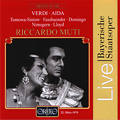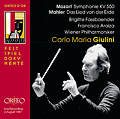ORFEO International
News
July 2009
Brigitte Fassbaender's Seventieth Birthday
That a pronounced allegiance to a particular region does not have to stand in the way of an international career is well illustrated by the career of Brigitte Fassbaender. After studying at the Nuremberg Conservatory, she joined the Bavarian State Opera in 1961, remaining loyal to the company throughout a career that lasted almost three and a half decades and that took her to all the world’s leading opera houses and concert halls, culminating, logically, in a second career in theatre administration, opera production and teaching that continues to the present day. 
Brigitte Fassbaender
Foto: Oda SternbergSince 1961 Brigitte Fassbaender has enjoyed a place of honour in the world of opera in Bavaria, even though her roots are not in this part of Germany: it was in Berlin that she was born into a musical household seventy years ago, and neither of her parents was Bavarian. Against this background it makes sense that in addition to her work as intendant of the Innsbruck Landestheater, she has also become artistic director of the Richard Strauss Festival in Garmisch-Partenkirchen: after all, Octavian in Der Rosenkavalier was undoubtedly one of her finest achievements both as a singer and as an actress. 
C 334 931 B
C 583 022 I
C 581 083 D
C 464 972 IHer famous performance under Carlos Kleiber at the 1973 Munich Opera Festival has been available on the Orfeo label since last year. Amusingly, she can also be heard as the Italian intriguer Annina in the same work, this time in a recording made eight years earlier. Neither this role nor that of Annina in Verdi’s La traviata, which she also recorded in 1965, allowed her much scope to display her talents, and yet even at this date it was clear that Brigitte Fassbaender was already working with a number of distinguished conductors and singers: 
C 096 841 A
C 636 041 B
C 654 052 Bthe two conductors were Joseph Keilberth and Giuseppe Patanè, while her colleagues onstage included Teresa Stratas, Fritz Wunderlich, Hermann Prey and Kurt Böhme, to name but a few. The two live recordings of Aida and Werther that were made in Munich in the 1970s, in both cases alongside Plácido Domingo, show that Brigitte Fassbaender needed fear no comparison in the Italian and French repertory, a point that also emerges from the operatic recital that she recorded in the studios of South German Radio: there is no Mozartean cantilena, no bel canto coloratura and no dramatic outburst, be it in Wagner or Tchaikovsky, that is not within the range of her artistic possibilities. Of course, all these attempts to document Brigitte Fassbaender’s artistry would be hopelessly incomplete without the concert and song repertory. (Any attempt at a comprehensive coverage would in any case be pointless.) Her lieder recitals set new standards in terms of their tonal beauty and handling of the words. (An all-Schumann programme with Erik Werba on Orfeo’s Salzburger Festspieldokumente label may serve to illustrate this point.) But the same is undoubtedly true of her contribution to countless oratorios under such formative conductors as Rafael Kubelík and Wolfgang Sawallisch. Among these recordings, pride of place should probably go to Mahler’s Das Lied von der Erde, an interpretation from the Salzburg Festival under Carlo Maria Giulini that is likewise available on the Orfeo label. We offer the singer our gratitude and our heartfelt congratulations!
top |